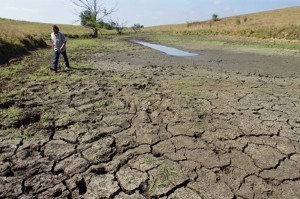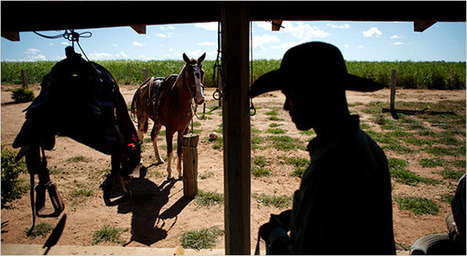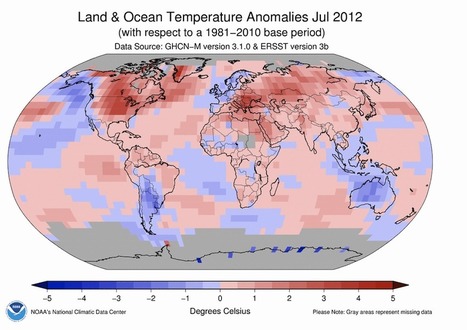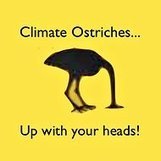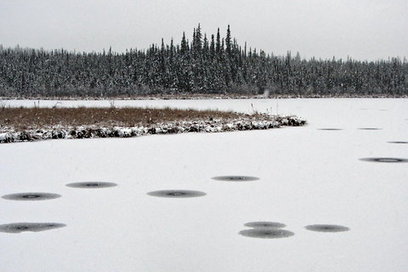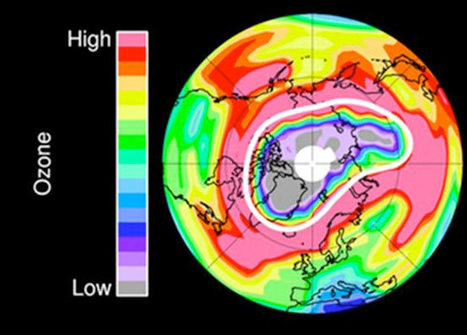 Your new post is loading...
 Your new post is loading...
"Science journalist Michael Lemonick doesn't want to be a doomsday prophet, but he does want to be realistic about the threat of climate change. 'Since I started writing about climate change all the way back in 1987, we've known what the cause is, we've known what the likely outcome is, and we've had time to act — and essentially we haven't acted,' he tells Fresh Air's Dave Davies. Lemonick is the co-author of a new book, Global Weirdness: Severe Storms, Deadly Heat Waves, Relentless Drought, Rising Seas, and the Weather of the Future. The book, published by the nonprofit research organization Climate Central, details the effects of climate change and greenhouse gases in ocean acidity, existing ecosystems, disruptions to food supply and rising sea levels. Lemonick says sea level has risen by about eight inches overall worldwide since around 1900, and the waters are expected to rise an estimated three feet by 2100."
"We need to sit and really think a bit about this summer’s extremely widespread record heat and drought. We’d like to think it will come and go. Of course we would. But history shows us that’s not always the way things work. The five-year drought in the American West that began the last decade was the worst in 800 years. Eight hundred! Scientists are talking about this century shaping up as a very likely century of mega-drought. With profound implications for crops, forests, water – for how and where we live. This hour, On Point: what if drought is here to stay?"
"The world's largest test facility for carbon capture and storage (CCS) opens with the aim of making the technology more affordable."
"'Welcome to Norway, welcome to Mongstad; and welcome to a great and important day.'
Norwegian Prime Minister Jens Stoltenberg did not shy away from superlatives as he formally inaugurated the carbon capture test facility at Mongstad near Bergen, on Norway's west coast.
'Today we are opening the world's largest and most advanced laboratory for testing carbon capture technologies... a unique test centre to meet one of the greatest challenges of our time.'
A trumpeter sprayed bright and airy notes, a choir of local children sang, and all appeared to be rosy in the world of carbon capture and storage (CCS)."
"In an effort to prevent farmers from cutting down rain forest, environmental groups are offering money." "José Marcolini, a farmer here, has a permit from the Brazilian government to raze 12,500 acres of rain forest this year to create highly profitable new soy fields. But he says he is struggling with his conscience. A Brazilian environmental group is offering him a yearly cash payment to leave his forest standing to help combat climate change. Mr. Marcolini says he cares about the environment. But he also has a family to feed, and he is dubious that the group’s initial offer in the negotiation — $12 per acre, per year — is enough for him to accept. 'For me to resist the pressure, surrounded by soybeans, I’ll have to be paid — a lot,' said Mr. Marcolini, 53, noting that cleared farmland here in the state of Mato Grosso sells for up to $1,300 an acre."
"Brazil's new Forest Code means it will struggle to meet its targets on curbing greenhouse emissions, according to a former environment minister. On the sidelines of the UN climate talks in South Africa, Marina Silva said the move will also reduce Brazil's global leadership on forests. The Senate passed the new Forest Code late on Tuesday. It will reduce the size of buffer zones around rivers, and weaken the amount of land that owners must leave forested. Past breaches will not be punished if perpetrators agree to a plan of ecological restoration. 'The approved law will make it difficult - and by a lot - for Brazil to keep their emission targets,' Ms Silva told reporters."
Experts worry that if the permafrost thaws in the Northern Hemisphere, huge amounts of carbon will be released into the air, greatly intensifying global warming. "In the minds of most experts, the chief worry is not that the carbon in the permafrost will break down quickly — typical estimates say that will take more than a century, perhaps several — but that once the decomposition starts, it will be impossible to stop.
'Even if it’s 5 or 10 percent of today’s emissions, it’s exceptionally worrying, and 30 percent is humongous,' said Josep G. Canadell, a scientist in Australia who runs a global program to monitor greenhouse gases. 'It will be a chronic source of emissions that will last hundreds of years.'
A troubling trend has emerged recently: Wildfires are increasing across much of the north, and early research suggests that extensive burning could lead to a more rapid thaw of permafrost."
Trees, natural carbon sponges, help keep heat-trapping carbon dioxide out of the atmosphere. But insect and human threats are taking a heavy toll on them. Experts are scrambling to understand the situation, and to predict how serious it may become. Scientists say the future habitability of the Earth might well depend on the answer. For, while a majority of the world’s people now live in cities, they depend more than ever on forests, in a way that few of them understand. Scientists have figured out — with the precise numbers deduced only recently — that forests have been absorbing more than a quarter of the carbon dioxide that people are putting into the air by burning fossil fuels and other activities. It is an amount so large that trees are effectively absorbing the emissions from all the world’s cars and trucks.
|
"July was the fourth-warmest such month on record globally, and the 329th consecutive month with a global-average surface temperature above the 20th-century average, according to an analysis released Wednesday by the National Climatic Data Center (NCDC).
The combined-average July temperature over global land and ocean surfaces was 61.52°F, which was 1.12°F above the 20th-century average. This was the 36th straight July with a global temperature above the 20th-century average.
The last time the globe experienced a cooler-than-average July occurred in 1976, when Gerald Ford was the U.S. president.
The globally averaged temperature over land areas was the third highest for July on record. For Northern Hemisphere land areas only, however, it was the warmest July on record, which is significant since this is where most of the planet’s land masses are located."
"The study, published last November in the Journal of Personality and Social Psychology, substantiates that when confronted with a distressing and complex issue that they know very little about, such as climate change, people are motivated to avoid learning more about it. Shepard and Kay, the authors of his paper call this 'motivated avoidance.' Their article explains how an 'ignorance is bliss' philosophy may thwart important social information from penetrating the minds of the public. So, if current educational strategies turn people off and motivate them to defer to government authorities or scientists to make decisions rather than trusting themselves to think critically or to change the world, how do we teach about troubling topics? A key to teaching youth about climate change is to teach critical thinking and to teach youth to take action on what they have learned. The ability of a person to believe in their power to make change in their own life and in the world at large is called self-efficacy. In his book 'Self Efficacy: The Exercise of Control,' Albert Bandura of Stanford University’s Department of Psychology documents “efficacy beliefs” in people’s lives and how they affect personal and social change. 'Efficacy beliefs shape the outcomes people expect their efforts to produce… 'People of low self-efficacy are easily convinced of the futility of effort in the face of impediments. Those of high self- efficacy view impediments as surmountable through perseverance.'"
"Methane is already at two and a half times the level that prevailed in the atmosphere before the Industrial Revolution. After a hiatus, it has been rising again in the last few years for reasons that researchers do not fully understand." "Instead, the best evidence – and it is sketchy – suggests that a varied mix of factors led to the increase. In 2007, excess rainfall in the tropics and excess warmth in the Arctic may have led to higher methane emissions from wetlands in both regions, and the excess tropical emissions probably continued into 2008. The methane level of the atmosphere kept rising in 2009, but the reason it did that year is a bit of a mystery. In 2010, excessive rainfall in the tropics may again have been a culprit. Results are still being analyzed for 2011, but so far it looks as though the increase has continued. Other factors, such as the breakdown of gas hydrates off the Arctic coast, could be playing a role, but if so, it is a small one so far, Dr. Dlugokencky said. Another potential source is the rising production of natural gas from hydraulic fracturing, with some of that gas inevitably escaping unburned into the atmosphere. Monitoring can detect, for instance, a hot spot of methane emissions over the Four Corners region of the West, where gas drilling has sharply increased. And the booming economies of Asia are most likely playing a role. But again, the evidence suggests that natural gas production is at best a minor factor."
In Brazil's breadbasket, Mato Grosso, there are efforts to fight climate change by paying landowners to preserve forests.
"Brazil, caretaker of the world’s largest rain forest, is about to enact broad new regulations that opponents say could loosen restrictions on Amazon deforestation and increase the country’s greenhouse gas emissions. The move comes after two years of often roiling debates and dozens of hearings across the country over how to update a 1965 law that was designed to control slash-and-burn agriculture. Backers say the proposed Forest Code bill, which is expected to be signed into law early next year, would protect the Amazon while easing the regulatory burden on small farmers. Brazil, a leader on climate change and host of next June’s U.N. Earth Summit in Rio de Janeiro, is charting a climate strategy shaped by domestic politics and economic concerns that sometimes appears at odds with its international environmental rhetoric. Such domestic pressures — clear also in increasingly influential developing countries such as China and India — have created uncertainty over how the world will curb its carbon output by the end of the decade, even as negotiators gear up to forge a new global warming pact by 2015. 'It sends a mixed message because Brazil has positioned itself as a country that’s committed itself to saving the forest cover to the benefit of the world,' said Christian Poirier, Brazil program director for Amazon Watch. 'The new forest code flouts all that.'"
Unprecedented loss of ozone over the Arctic earlier this year created the first ozone 'hole' over the North Pole, similar to the infamous one that opens up every year over the Antarctic, scientists say.
Climate scientists say a new edition of an influential atlas vastly overrepresents Greenland’s rate of glacial melt.
|



 Your new post is loading...
Your new post is loading...


